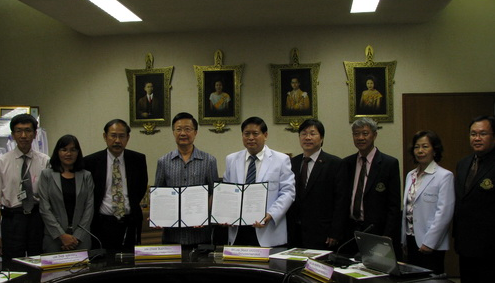
The Faculty of Medicine of Chiang Mai University and the National Health Commission Office (NHCO) of Thailand signed an academic cooperation agreement to establish the center for research and training on the assessment of the health impacts of public policies and projects. The signing by NHCO chief executive officer Dr Amphon Jindawatthana and Assoc Prof Dr Wattana Navacharoen, dean of the Faculty of Medicine, took place at the Boonsom Martin Meeting Room in the faculty.
Dr Amphon quoted Paragraph 2 of Section 67 in the Community Rights Part of the Constitution of the Kingdom of Thailand, B.E. 2550 (A.D. 2007), as stipulating that ‘Any project or activity which may seriously affect the community with respect to the quality of the environment, natural resources and health shall not be permitted, unless, prior to the operation thereof, its impacts on the quality of the environment and on public health have been studied and assessed and a public hearing process has been conducted for consulting the public as well as interested persons and there have been obtained opinions of an independent organization, consisting of representatives from private organizations in the field of the environment and health and from higher education institutions providing studies in the field of the environment, natural resources or health.’
“Besides, the National Health Act, B.E. 2550 (A.D. 2007), describes the important content on health impact assessment, according to its Section 5, that ‘A person shall enjoy the right to live in the healthy environment and environmental conditions. A person shall have the duties in cooperation with state agencies in generating the environment and environmental conditions…’ and, according to its Section 11, that ‘An individual or a group of people has the right to request for an assessment and participating in the assessment of health impacts resulting from a public policy. An individual or a group of people shall have the right to acquire information, explanation and underlying reasons from a state agency prior to a permission or performance of a program or activity which may affect his or her health or the health of a community, and shall have the right to express his or her opinion on such matter.’ ”
Assoc Prof Dr Wattana said that previous health impact assessment encountered many obstacles especially those concerning the development of new knowledge, the supervision of activities, projects and public policies after health impact assessment, and efforts to empower communities to monitor and examine activities, projects and public policies.
“Assoc Prof Dr Pongthep Wiwattanadet, head of the Department of Community Medicine in his capacity as the director of the Health Impact Assessment Network, developed an instrument to enable communities to monitor and examine activities, projects and public policies. It applies an epidemiological method that is called popular epidemiology and based on walking maps. It was tried in many areas and yielded satisfactory results.”
Dr Wiput Phoolcharoen, chairman of a commission for the development of health impact assessment systems and mechanisms, said the instrument should be publicized. As the Department of Community Medicine of the faculty has high potential to develop knowledge about health impact assessment, the cooperation on the establishment of the center for research and training on health impact assessment happens there. According to him, it will benefit people in general especially in relation to their assessment of the health impacts of projects and activities including those concerning factories and power plants.
Source: HEDLOMNEWS on January 25, 2014
